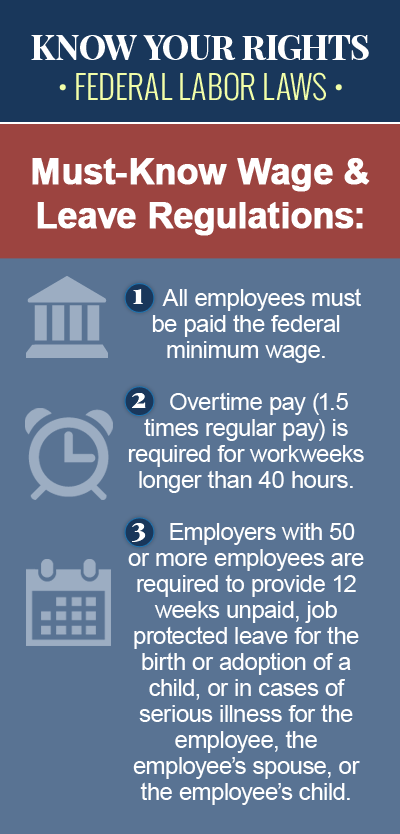FEDERAL EMPLOYMENT LAW
There are more than 180 federal laws administered and enforced by the U.S. Department of Labor, including employment laws that protect employees from workplace discrimination on the basis of age, gender or race, those that enforce federal wage standards for employees, those that protect the safety and health of workers on the job, and those that protect whistleblowers who report violations of workplace safety and other laws. Employment laws, also known as labor laws, govern the rights and duties between workers and employers, and are primarily intended to keep workers safe and ensure that their rights as employees are not violated. The main sections of employment law are described in detail below.
Federal Wage Laws
Wage laws were enacted to establish federal wage standards for full- and part-time employees in the United States, and remain in place to ensure that workers are treated fairly on the job, regulating such things as minimum wage, meal breaks and overtime pay. Wage laws dictate that the current federal minimum wage for covered, nonexempt employees is $7.25 per hour – although some states have approved a minimum wage that is higher than the federal standard – and require that an overtime rate of one-and-one-half-times the regular rate of pay be paid to employees who work more than 40 hours in a given workweek.
Occupational Safety and Health
Regulated by the U.S. Occupational Safety and Health Administration (OSHA), workplace safety and health is an area of employment law intended to protect the health, safety and well-being of people engaged in work or employment. Employers covered by the Occupational Safety and Health (OSH) Act are required to comply with federal workplace standards instituted by OSHA, and must adopt certain workplace practices and processes to protect employees from known hazards on the job site. This may include providing workers with the proper personal protective equipment, and limiting their exposure to physical hazards and toxic substances that may cause serious injury or death.
Workplace Discrimination
Workplace discrimination is another area of employment law that protects the rights of employees, making it illegal for employers to discriminate against workers on the basis of race, age, ethnicity, gender, religious beliefs, disability, or other protected classifications. Despite the passage of Title VII of the Civil Rights Act of 1964 and subsequent legislation prohibiting employers from hiring, firing, transferring, terminating or retaliating against an employee because of his or her “race, color, religion, sex, or national origin,” unlawful discrimination continues to be a major problem in workplaces across the United States.
Whistleblower/Qui Tam Lawsuits
Another type of workplace discrimination involves employers taking “adverse action” against whistleblowers who file an OSHA complaint over a safety concern, report a job-site accident or injury, or exercise any of the rights provided to employees under the whistleblower statutes enforced by OSHA. The Whistleblower Protection Program prohibits employers from discharging or otherwise retaliating against workers who report violations of workplace safety and health, food safety, motor vehicle safety, and securities laws, among others. For whistleblowers who expose fraud against the government, a qui tam lawsuit can be filed to recover government funds, a portion of which the whistleblower, or “relator,” may be entitled to.
Learn More About Federal Wage Laws




